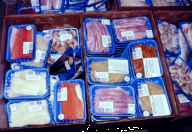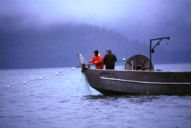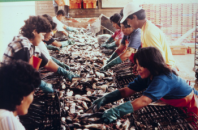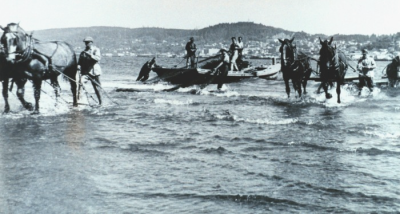|
Types of Interviews
Interviews conducted for the Local Fisheries Knowledge
Project fall primarily into three broad categories:
| • |
Documenting larger cultural, social,
and economic changes to understand how they have affected
the lives of individuals and communities. |
| |
Local communities and their cultures change
over time just as larger society changes. As individuals
react to changing circumstances, their families and communities
are also affected. Circumstances that prompt change may include:
|
| |
| - |
Increases or declines of natural resources
|
|
| - |
Climate change
|
| - |
Technology changes
|
| - |
Economic reorientations (regionally, nationally,
globally)
|
| - |
Lifestyle preferences
|
|
These factors can result in individuals seeking
new professions, shifts in gender roles, and inward
or outward migrations of people from communities,
either bringing new ideas into a community or removing
special expertise when they go.
|
|
Hauling in 400 tons of jack
mackerel. Chile. Photo by C. Ortiz Rojas.
|
|
| • |
Describing particular aspects of local
fishing culture and society
Interviewers may collect information
such as fishing legends and myths,
food-ways,
folk art,
family involvement
in
fishing businesses, life in a fishing community, and
how fishermen interact with each
other.
|
 |
| |
|
Three generations
of native Alaska fishers. Photo by Karen Ducey, NOAA
Fisheries. |
| • |
Learning about local ecological knowledge
Local ecological knowledge (LEK) and traditional ecological knowledge (TEK) research
is primarily interested in what people know about their local environment, how
they acquired the knowledge, and their resource management practices.
|
 |
| |
|
Inca terns linger on the rail of a
fishing boat. Peru. Photo by Teobaldo Dioses. |
Examples of Topics
Students will choose specific interview topics
based on personal interest or as part of a class project.
Topics may include, but are not limited to:

|
• |
Species behavior, seasonal patterns,
life history, population, range
|
 |
| • |
Historical knowledge of species, habitats,
climate
|
| • |
Ecological relationships and species interactions·
|
|
Orca spyhopping. NOAA Photo Library
|
|
|
Processed and packaged fish. NOAA Photo Library. |
 |
• |
Fishing gear and vessels
|
 |
| • |
Business aspects of fishing
|
| • |
Fishing culture and society
|
| Jack in seagrass. Heather Dine, Florida
Keys National Marine Sanctuary. |
|
Family fishing for recreation in New
Jersey. Edward Pastula, NOAA Fisheries. |
 |
• |
Impacts of fishing regulations on individuals, families,
and communities·
|
 |
| • |
Gender roles and issues in fishing
|
| Courtesy
of the NOAA Fisheries Alaska Region |
|
Fish processing, Peru. Teobaldo Dioses. |
Exploring Local Fishing
History
| |
 |
|
|
Horses pulling in a seine
from the Columbia River. 1938. Photo by Sean Linehan,
NOAA’s Ocean Service. |
|
To get historical perspectives, students may seek out older,
retired fishermen, such as those over 70, with whom to conduct
oral histories. These fishermen have decades of fishing experience.
Over the last century, the fishing industry has experienced
extreme changes in fishing technology and in the abundance
of many commercially fished species. Older fishermen are
a valuable resource from which to learn about these changes.
Some older fishermen may also be able to teach students about
fishing crafts that are no longer used, like knitting trap
heads and bait bags.
|
|

